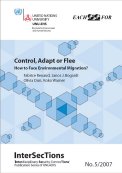If you’re in the mood for a highly technical, legal read, the Columbian Journal of Environmental Law published “Sea Level Rise and the Freely Associated States: Addressing Environmental Migration Under the Compacts of Free Association” in vol. 37, no. 1.
From the introduction:
Few issues in the climate change debate today are as compelling or as contested as sea level rise. In the coming century, rising sea levels have the potential to submerge coastal regions and displace millions of people. While countries throughout the world will be affected, the Intergovernmental Panel on Climate Change (IPCC)
has identified small island nations as “especially vulnerable.” Because these nations are physically small and often have high population densities, underdeveloped economies, and scarce resources, many will have difficulty adapting to the effects of sea level rise and any associated population displacement. Some island nations could disappear completely, in which case entire national populations would be forced to relocate abroad.
Three small island nations vulnerable to sea level rise—the Republic of the Marshall Islands (the RMI), the Federated States of Micronesia (the FSM), and the Republic of Palau (Palau)—have relationships of “free association” with the United States. These Freely Associated States (FAS) are sovereign nations that have negotiated Compacts of Free Association with the United States, under which the U.S. provides the states with certain types of assistance and has full “authority and responsibility . . . for security and defense matters” relating to the states. While the central provisions of the Compacts address foreign assistance and defense, the Compacts are comprehensive in scope and fully define the relationships between the U.S. and
the FAS. This Note focuses on the immigration provisions of the Compacts, which give citizens of the FAS the right to enter, work, and live in the U.S. with few restrictions. Although these provisions were originally negotiated long before rising sea levels threatened the habitability of islands within the FAS, because current refugee and immigration laws do not adequately address human displacement associated with climate change, these provisions could inadvertently serve as one of the few immigration options open to citizens of the FAS who choose to, or are forced to, relocate abroad due to rising sea levels.
mechanism to address migration from the FAS connected with sea level rise. It argues that the immigration provisions will not provide an adequate solution to permanent or large-scale population displacement, but they could form part of an adaptive response to the climate change pressures that threaten the future of these island nations. Any adaptive response to climate change in the FAS, however, must prioritize the rights of the citizens of the FAS to remain in their countries under safe and sustainable conditions.



